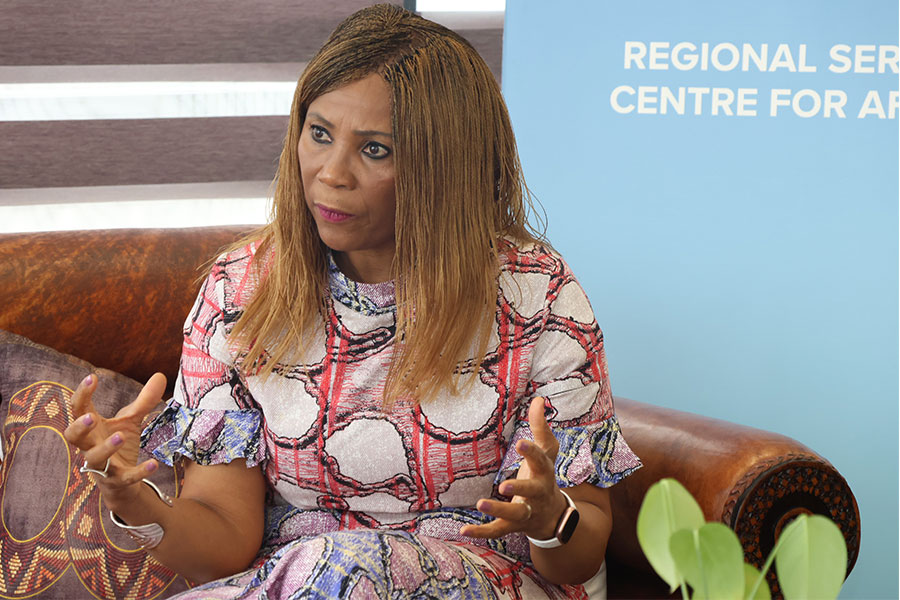
View From Arada | Apr 09,2023
Jun 28 , 2025
By Ameenah Gurib- fakim , María F. Espinosa and Shamshad Akhtar
Amid rising poverty, sluggish growth, escalating climate disasters, and geopolitical instability, sovereign debt has emerged as the single greatest obstacle to achieving global development goals. Without bold structural reforms, the current financial system will continue to serve the interests of the few while crushing the prospects of billions of people, especially in the Global South.
On June 30, world leaders will gather in Seville, Spain, for the Fourth International Conference on Financing for Development (FfD4). Despite today's complex geopolitical landscape, countries have reached consensus on a draft outcome, an encouraging signal that multilateralism remains a viable path forward. The "Seville Commitment" was agreed last week in New York and will be adopted on the last day of the conference.
Among the positive developments are two notable pledges. It wants to create a new intergovernmental process to make recommendations on sovereign debt, giving developing countries a seat at the table in setting global debt norms. And, it establishes a debt facility focused on reducing the costs of capital and scaling up tools like debt swaps to help countries free up much-needed fiscal space.
These steps mark important progress, but they are far from sufficient. What remains missing is a credible, comprehensive mechanism for sovereign debt relief. Without it, many countries will remain trapped in a vicious cycle of debt, underinvestment, and climate vulnerability. This concern was also emphasised in the recent report by the Vatican-backed Jubilee Commission, which argues that "the international community has a moral obligation to advance a [second Heavily Indebted Poor Countries Initiative]."
As leaders from Africa, Latin America, and Asia, we know the developing world's debt crisis firsthand. Our countries have grappled with impossible trade-offs between repaying creditors and investing in their future. What we need now is not charity, but a credible, rules-based system for sovereign debt relief that prioritises economic development and meaningful climate action over short-term financial gains.
The numbers speak for themselves. More than half of the world's low-income countries are either in debt distress or at high risk of it. Since 2010, public debt across the Global South has grown twice as fast as in the Global North. As a result, over 3.3 billion people now live in countries that spend more on interest payments than on healthcare or education. In 2022-23 alone, developing countries recorded net cash outflows to external public and private creditors (excluding multilateral development banks).
The borrowing costs of low-income countries have surged to a four-decade high, driven by rising interest rates and slowing global economic growth. Given that this trend is unlikely to reverse anytime soon, World Bank Chief Economist, Indermit Gill, has warned that the world is rapidly approaching a sovereign-debt disaster, with "too many developing economies" caught in a "doom loop."
The consequences are severe. More than 90pc of African countries now spend a larger share of their export revenues on interest payments than postwar Germany did under the 1953 London Debt Agreement. Small island developing states such as Dominica are forced to take on more debt to rebuild after recurring climate disasters. And Pakistan, facing devastating flooding in recent years, remains afloat only through repeated bailouts from the International Monetary Fund (IMF).
Yet, despite the high stakes, the international community continues to focus on incremental adjustments that treat the symptoms rather than the disease. Although initiatives like the G20's Common Framework for Debt Treatments have brought some relief, the system remains ad hoc, slow, and fragmented, making it incapable of delivering timely or equitable solutions.
This year offers a critical opportunity to change course. The draft outcome of FfD4 reflects some momentum, but rhetoric should now be translated into results. We have to seize this moment to create a more coherent, predictable, and inclusive approach to debt relief.
We are calling for the immediate launch of a debt relief initiative for countries unable to invest in development due to unsustainable debt burdens or high servicing costs. Such an initiative should bring all creditors – private, bilateral, and multilateral – to the table and ensure that the process is both predictable and inclusive.
The solutions should go beyond mere financial fixes. Debt relief should be linked to strategic investments in healthcare, education, and climate resilience, enabling countries to unlock the fiscal space necessary to achieve the UN Sustainable Development Goals (SDGs) and promote green growth.
This also demands a fundamental shift in how debt sustainability is assessed. Current approaches fail to account for developing countries' investment needs or the escalating risks posed by climate change and nature loss. Instead of penalising countries for investing in their futures, we need enhanced debt-sustainability assessments that align with development and climate goals.
The multilateral system was created to solve global problems. Today, however, it is struggling to keep pace with rapid geopolitical change. As the world moves toward multipolarity, calls for a fairer global order are gaining momentum. Europe, in particular, has an opportunity to restore its credibility in the eyes of the Global South by taking the lead on debt reform, both in principle and in practice.
Our commitment will not be measured by the declarations we make, but by the outcomes we deliver. The world does not need more promises. It needs real, structural debt reform – reform that empowers developing countries to invest in the futures their people deserve.
PUBLISHED ON
Jun 28,2025 [ VOL
26 , NO
1313]

View From Arada | Apr 09,2023

Fortune News | Aug 09,2025

Exclusive Interviews | Aug 03,2025

Radar | Jul 30,2022

Radar | Dec 07,2019

Radar | May 16,2020

Commentaries | Jan 19,2024

Viewpoints | Feb 05,2022

Commentaries | May 27,2023

Radar | Oct 08,2022

Photo Gallery | 175507 Views | May 06,2019

Photo Gallery | 165726 Views | Apr 26,2019

Photo Gallery | 156083 Views | Oct 06,2021

My Opinion | 136826 Views | Aug 14,2021

Dec 22 , 2024 . By TIZITA SHEWAFERAW
Charged with transforming colossal state-owned enterprises into modern and competitiv...

Aug 18 , 2024 . By AKSAH ITALO
Although predictable Yonas Zerihun's job in the ride-hailing service is not immune to...

Jul 28 , 2024 . By TIZITA SHEWAFERAW
Unhabitual, perhaps too many, Samuel Gebreyohannes, 38, used to occasionally enjoy a couple of beers at breakfast. However, he recently swit...

Jul 13 , 2024 . By AKSAH ITALO
Investors who rely on tractors, trucks, and field vehicles for commuting, transporting commodities, and f...

Oct 18 , 2025
The political establishment, notably the ruling party and its top brass, has become p...

Oct 11 , 2025
Ladislas Farago, a roving Associated Press (AP) correspondent, arrived in Ethiopia in...

Oct 4 , 2025
Eyob Tekalegn (PhD) had been in the Governor's chair for only weeks when, on Septembe...

Sep 27 , 2025
Four years into an experiment with “shock therapy” in education, the national moo...

Oct 18 , 2025 . By NAHOM AYELE
In a sweeping reform that upends nearly a decade of uniform health insurance contribu...

Oct 18 , 2025 . By BEZAWIT HULUAGER
A bill that could transform the nutritional state sits in a limbo, even as the countr...

Oct 18 , 2025 . By SURAFEL MULUGETA
A long-planned directive to curb carbon emissions from fossil-fuel-powered vehicles h...

Oct 18 , 2025 . By BEZAWIT HULUAGER
Transaction advisors working with companies that hold over a quarter of a billion Bir...